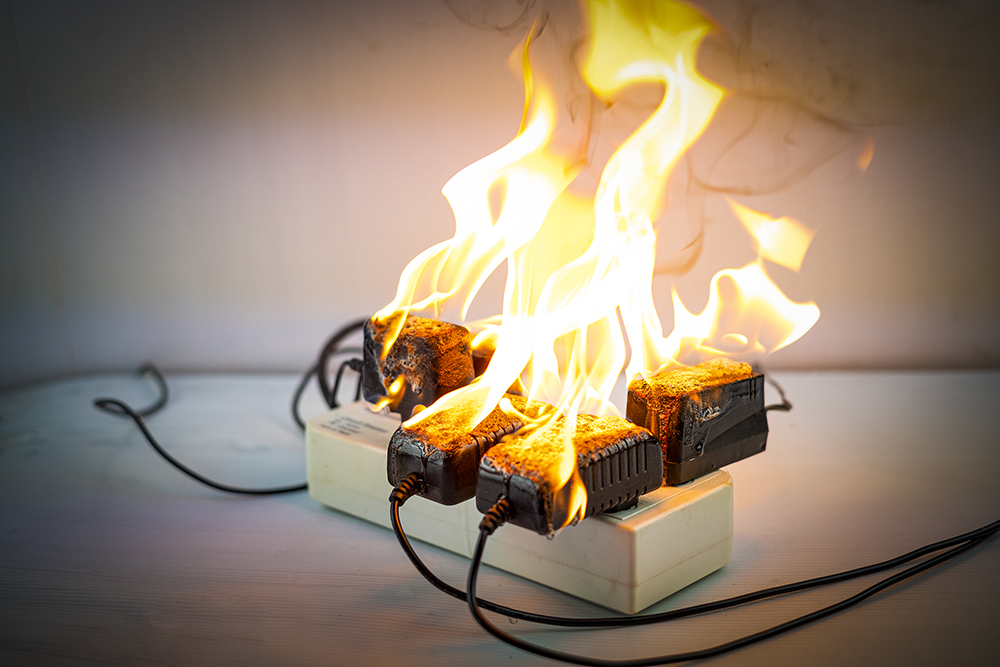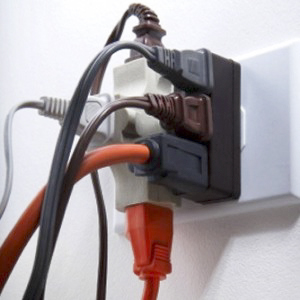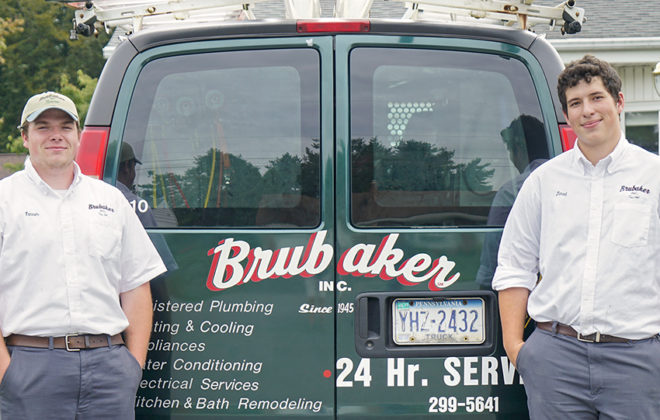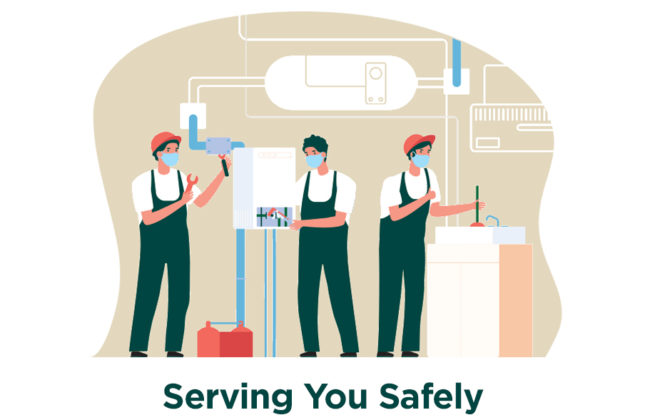May is National Electrical Safety Month!

Are you as safe as you can be around electricity?
People are injured or killed by electricity every year. Statistics tell us that there are over 400 electrocutions and over 4000 non-fatal injuries every year in the United States. That is more than one death each day of the week across the country. And some 40% of those are from or related to products and equipment in the home. Large household appliances account for the largest portion of home-related electrocutions at 10%.
Some startling statistics regarding electrocutions across the country:
- Electrocutions from wiring hazards, including damaged or exposed wiring and household wiring together totaled approximately 20%
- Ladders contacting power lines caused 9 percent of electrocutions; in another 5% of deaths, victims had contacted high voltage power lines.
- Power tools were responsible for another 9 percent of deaths.
- Landscaping, gardening and farming equipment cause 7% of electrocutions each year.
- Annually, electrical hazards are listed as the cause of approximately 4,000 injuries.
- Electrical incidents, while only a small portion of those that occur on-the-job, are far more likely to be fatal than incidents away from the job.
- Electricity ranks sixth among all causes of occupational injury in the United States.
- Before the advent of Ground Fault Circuit Interrupters (GFCIs), nearly 800 people were killed annually from household electrocution. That number has decreased to fewer than 200 deaths annually from household electrocution.
Not all electrical fatalities are directly from electrocution. Electricity is also the cause of over 140,000 fires each year in the United States, resulting in 400 deaths, 4,000 injuries and $1.6 billion in property damage. Total economic losses due to electrical incidents are estimated to exceed $4 billion annually.
 What can we do to better protect ourselves from shock or electrocution? We can reduce our risk by: (1) understanding how electricity works, (2) recognizing potential electrical hazards when we see them, and (3) learn about safety devices that can prevent electric shock.
What can we do to better protect ourselves from shock or electrocution? We can reduce our risk by: (1) understanding how electricity works, (2) recognizing potential electrical hazards when we see them, and (3) learn about safety devices that can prevent electric shock.
Electricity naturally flows to the earth, or to ground, through anything that will conduct electrical current. There are some substances, like rock, wood, and glass that are not good conductors of electricity. Water, however, is a good conductor of electricity, along with many metals. Electricity will pass through the human body, sometimes with fatal results, trying to get to ground. With the human body made mostly of water, it increases the risk of shock or electrocution. Fortunately, because often we don’t have a good ground to the earth, we are saved from nothing more than a shock.
However, it doesn’t take much electricity to do significant damage to the human body. It isn’t necessarily the voltage that does the damage; it is the amperage. And only a few thousandths of an amp can be all it takes to cause grave injury to the human body.
If an appliance or tool is faulty or has a shorted wire, for instance, the electric current may try to find another path to ground. That’s why electrical systems should always be grounded. A safe path to ground for electricity is away from your body and confined within whatever piece of electrical equipment that you are using.
Here are 20 easy, common sense steps to take to protect yourself from electric shock or electrocution:
- Never mix water and electricity. Always keep electrical appliances away from water and moisture. Whether it’s on or off, if a plugged-in appliance falls – or is accidentally dropped – into water, do not attempt to retrieve or unplug it. Go immediately to your home’s panel board and shut off power to the corresponding circuit. Once that’s done, the appliance can be safely unplugged and removed from the water. Once the device has dried thoroughly, have an electrician evaluate whether or not it’s fit for continued use.
- Proper use of appliances and equipment. Be sure to use all of your power tools, appliances, and equipment according to the manufacturer’s instructions.
- Pay attention to what your appliances are telling you. When an appliance repeatedly trips a circuit breaker, blows a fuse, or gives you shocks, it’s not just a coincidence – these are signs that something is wrong. Prevent further – and possibly more dangerous – malfunctions from occurring by immediately unplugging the appliance and discontinuing use until a professional electrician can inspect it, make repairs, and ultimately declare the appliance safe.
- Install Ground Fault Circuit Interrupters (GFCI). In newly constructed homes, GFCI receptacles are a requirement anywhere that electrical outlets and water will be in close proximity to one another. GFCIs detect current leakages (or ground faults) in electrical circuits – such as would occur when a powered device made contact with water. The GFCI then shuts off power to that receptacle almost instantaneously, preventing electrical shock, burns, and electrocution. If you live in an older home that didn’t come standard with GFCIs, installing them in place of traditional outlets in your bathroom, kitchen, and garage is an easy way to prevent severe electrical injuries – and at very little cost.
- Make sure you are using the right size circuit breakers and fuses. If fuses and circuit breakers aren’t the right size and wattage rating to match the specifications of their circuits, they’re going to fail right when you most need them to perform. Read packages carefully when shopping for replacements. If you’re not sure which size to buy, have an electrician take a look at your panel box and label it with the circuit breaker or fuse size needed (for easy future reference). And as long as you’re making a trip to the hardware store, stock up with a few extra – you’ll be happy to have them on hand when the next need arises.
- Power strips, cords, and surge protection devices. Make sure power strips, cords, and surge suppressors are designed to handle the loads for their intended use. Avoid overloading circuits by plugging too many items into the same outlet.
- Be kind to your cords. Be sure to treat power cords properly – never nail them or tightly tack them down, and regularly check to make sure that they’re not pinched between or underneath furniture. Excessive pressure on power cables can damage insulation (exposing the conductor), or compress the conducting wire, which can lead to overheating and put you at risk for an electrical fire. When storing them, try not to roll them up and hang them off of a hook as this can create a pinch point and lead to premature wear and possible fraying of the cord at the point it hangs from.
- Three-Prong Plugs. The electrical outlets in most homes now have three-wire receptacles that accommodate electrical cords with three-prong plugs. The third prong provides a path to ground along which the electric current travels. Most major appliances, such as stoves, refrigerators, and computers, have three-prong plugs, meaning that they can be properly grounded. Many older homes may not have three-wire receptacles. If your home does not, you should have an electrician rewire your home to accommodate the three-prong plugs. Although three-prong adapters can be purchased, they are suggested only for temporary use. Never to clip the third prong off a plug to make it fit a two-hole outlet.
 Avoid overloading your electrical outlets. Cubes taps – those little boxes that allow you to plug several appliances into a single outlet – may seem like a major convenience, but they can actually put you on the fast track to circuit overload, overheated wiring, and even fire. If you absolutely must use one, do the math before plugging in. Know the maximum power demand that the cube-tapped receptacle can handle, and be certain that the collective pull (power requirement) of the devices you’re plugging into it doesn’t exceed that rating.
Avoid overloading your electrical outlets. Cubes taps – those little boxes that allow you to plug several appliances into a single outlet – may seem like a major convenience, but they can actually put you on the fast track to circuit overload, overheated wiring, and even fire. If you absolutely must use one, do the math before plugging in. Know the maximum power demand that the cube-tapped receptacle can handle, and be certain that the collective pull (power requirement) of the devices you’re plugging into it doesn’t exceed that rating.- Protect children with outlet covers. Outlet covers prevent babies and small children from sticking their fingers and other objects into unoccupied receptacles, protecting them against shock and electrocution. You can either use the plug-in type, or opt for special child safety wall plates, which feature built-in, retractable covers that automatically snap back into place when outlets aren’t in use.
- Replace missing or broken wall plates. Wall plates protect your fingers from making contact with the electrical wiring behind them. Broken wall plates (or the absence of them altogether) can be especially dangerous in the dark. When trying to locate a switch by touch, you may end up being shocked or electrocuted if you miss the mark and touch live wires instead.
- Keep electrically powered outdoor tools dry. Water and electricity are a very bad combination. Whether it’s raining, just finished raining, or you’ve recently run the lawn sprinklers, never attempt yard work with electrically powered tools in wet conditions. Protect yourself from shock and electrocution by keeping your electric hedge trimmer, weed whacker, and lawnmower safely unplugged and stowed away until precipitation has stopped, grass and foliage is dry, and puddles can be easily avoided.
- Match the light bulb’s wattage rating to the lamp. Whenever choosing light bulbs to use with a lamp, be sure to check that lamp’s maximum wattage specifications. This can often be found printed around the light bulb socket. Always use a light bulb with wattage that’s equal to or less than the maximum wattage listed on the lamp – too strong a bulb can lead to overloaded lamp wiring, which is a fire hazard.
- Ladders. Whether a step ladder or extension ladder, the material it is constructed of and where you place it when you use it, can make the difference between life and death. While wood is a relatively good compound to use, a fiberglass ladder is better as it is a very poor conductor of electricity. In addition, no what you are going to be up against—any kind of power lines, cords, electric panels, etc. If you can, stay away from them with your ladder.
- Kitchen. An ungrounded faulty appliance, such as an electric toaster or blender, used near a grounded kitchen sink can be dangerous. Do not handle or operate appliances when your hands are wet or when the appliances are on wet surfaces, such as a countertop that has water on it.
- Bathroom. Never touch electrical equipment while in the bathtub. Keep all electrical appliances far enough away from water in tubs, showers, and sinks so you can’t touch them, and they can’t fall in and discharge electricity through the water—and through you. Receptacles in bathrooms should have a ground fault circuit interrupter.
- Laundry room. An ungrounded faulty appliance anywhere can be a hazard because you could become a connection to ground for escaped electricity. For example, handling an ungrounded clothes iron while touching an operating washing machine could be dangerous because you could become a path to ground for the current. In this scenario, the washing machine is grounded, but the iron is not. When you touch the washing machine while using the ungrounded iron, the electricity from the iron will travel through you as it tries to get to ground, which in this case would be through the washing machine.
- Workshop. Ungrounded faulty tools are always hazardous. Make sure power tools are grounded, or are double-insulated. Wear rubber-soled shoes, stand on a rubber mat, and keep work floors dry. Receptacles in basements and garages should have a ground fault circuit interrupter.
- Swimming pool. Pools are similar to bathtubs in that you never want to touch electrical devices (unless they are designed for use in or near the pool and are in good working condition) while you are in the pool. Pool lights and pumps may become faulty and create hazards. Make sure your pool has only properly installed lighting and equipment. Receptacles near pools should have ground fault circuit interrupters.
- What to do should you have a problem. Contact us at Brubaker Inc. at 717.299.5641 or email us to schedule a service call and we will schedule a visit by one of our electrical service technicians to solve any electrical problem that you might have and answer any electrical questions for you.



